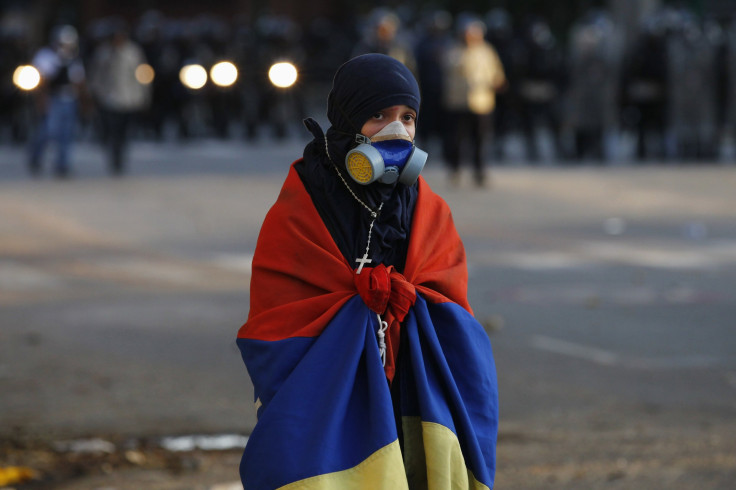
The Miami Herald reported on Monday that Debbie Wasserman Schultz, a Democratic representative from Florida who is also the chairwoman of the Democratic National Committee, says high-level officials in the Obama administration have told her the president is considering imposing sanctions on Venezuelan officials amid violence against opposition protestors. In mid-February Obama criticized the government of Nicolás Maduro for its “unacceptable” crackdown. “There should be sanctions on individuals … The administration is looking at those,” said Wasserman Schultz, echoing calls from Florida lawmakers on both sides of the aisle who are responding in part to pressure from a Venezuelan population that has leaped in number since late president Hugo Chávez took power in 1999.
From 91,507 in 2000, over 250,000 Venezuelans now call the United States home, according to the Pew Hispanic Center. Some 40 percent live in Florida. Compared to other Hispanic groups, they’re more likely to hail from the middle and upper classes and to have superior education (51 percent have a college degree). Much of that recent surge in number owes to the policies and rhetoric of Chávez, an ardently populist booster of state socialism who much of that class saw as hostile to business.
Just a year after Chávez’s death, his successor Nicolás Maduro has presided over a wave of protests originally spearheaded by students and calling for measures to contain spiraling crime rates and a deteriorating economy. His government has responded by trying to quash what he calls a “fascist” coup attempt, including arrests of top opposition leaders like Leopoldo López, who is facing charges that could put him in prison for as much as 10 years. And many of the deaths stemming from the protests -- which reached 19 on Tuesday after a 26-year-old agricultural engineering student’s car hit a barricade set up in the road by demonstrators in the southwestern state of Táchira, killing him instantly -- have come at the hands of colectivos, or grassroots groups with loose, symbolic, often nebulous connections with the government. More damning for Maduro’s government, three members of the Bolivarian Intelligence Service were even implicated (and later arrested for) the shooting deaths of two protestors on Feb. 12.
That sparked an outcry from Venezuelans abroad. A group of Cuban-American representatives from South Florida lawmakers soon took heed, drafting a House resolution condemning violence against peaceful protestors and calling for greater democracy in Venezuela. Senator Marco Rubio of Florida, along with Democratic Senator Bob Menendez, a Cuban-American from New Jersey, also drafted a resolution urging Obama to “immediately impose targeted sanctions, including visa bans and asset freezes, against individuals planning, facilitating, or perpetrating gross human rights violations against peaceful demonstrators, journalists, and other members of civil society in Venezuela.”
Rubio has continued that campaign, pronouncing lack of swift public action against Maduro’s government “shameful” in an impassioned Senate floor speech last week. He later told the Miami Herald that his proposed sanctions, in particular the denial of travel visas to the US, would be “devastating” for officials who he accused of pilfering from the Venezuelan public and investing in the United States. “What a lot of these people are doing is they’re stealing money in Venezuela,” Rubio said, “because of their governmental power or are unfairly getting access to it. And then they come to Miami with their families on the weekends … They go to Disney World and Universal Studios. They have apartments and money and cash and bank accounts. They parade through the streets of Miami. They’re all over the place. And I think that would be a real sanction for a lot of them.”
Who’ll be targeted by the sanctions?
“The key question is: based on what information would the US determine who these sanctions are applied against?” says David Smilde, senior fellow at the Washington Office on Latin America.
Rubio has not named specific officials to be targeted by his proposed sanctions. Upon query from the Latin Times, representatives from Rubio’s office referred to an interview with the senator by CBS Miami. To the question of who and how many, Rubio said that was a matter for the State Department to work through. He also dismissed the idea of oil sanctions, saying Venezuela's mismanagement of revenues preempted US action. But he added that he held Maduro “directly responsible” for violence against protestors.
Smilde thinks assigning responsibility might be tougher when it comes to targeting officials for sanctions. “The thing is, this builds off a perception of the Venezuelan context being one where there are gross human rights violations being committed purposefully by the government. It could be behind the scenes, but right now there’s no information out there to indicate that,” he told the Latin Times. “The whole thing has clearly been excessive use of force. Some of it has been perpetrated by the para-state colectivos” -- groups which Rubio and Menendez’s resolution also demands be disarmed and dissolved.
“The National Guard has also arrested people and perpetrated violence. But nothing of the kind you can really point to a smoking gun. If the armed forces were going into places and opening fire, that’d be one thing. But those who have actually opened fire are not really in the National Guard or armed forces, except for the intelligence police on Feb. 12. They were supposedly off-duty or working security, or they weren’t supposed to be there. So it’s not clear who would be to blame there.”
“To me, this is about domestic constituency … I don’t really know what they have in mind, who they’d be able to point to.”
© 2025 Latin Times. All rights reserved. Do not reproduce without permission.





